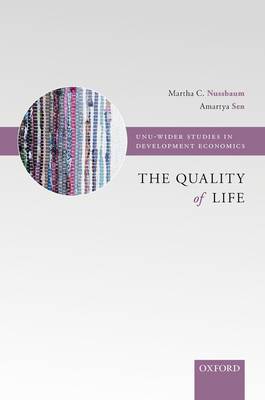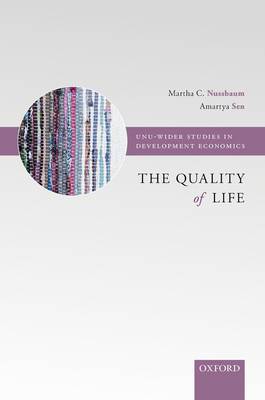
Wil je zeker zijn dat je cadeautjes op tijd onder de kerstboom liggen? Onze winkels ontvangen jou met open armen. Nu met extra openingsuren op zondag!
- Afhalen na 1 uur in een winkel met voorraad
- Gratis thuislevering in België vanaf € 30
- Ruim aanbod met 7 miljoen producten
Wil je zeker zijn dat je cadeautjes op tijd onder de kerstboom liggen? Onze winkels ontvangen jou met open armen. Nu met extra openingsuren op zondag!
- Afhalen na 1 uur in een winkel met voorraad
- Gratis thuislevering in België vanaf € 30
- Ruim aanbod met 7 miljoen producten
Zoeken
€ 102,45
+ 204 punten
Omschrijving
This is an open access title available under the terms of a CC BY-NC-ND 3.0 IGO licence. It is free to read at Oxford Scholarship Online and offered as a free PDF download from OUP and selected open access locations. The idea of the quality of life is central to economic and social assessment and also to public policy, social legislation, and community programs. However, the commonly used indicators of economic success such as per capita income are at best crude measures of the quality of life. There is a strong need for a systematic exploration of the content, reach, and relevance of the concept of the quality of life, and ways of making it concrete and usable. In this collection of essays, some leading economists and philosophers rise to that challenge and provide a wide-ranging investigation. The essays include examinations of recent attempts to replace incomes and utilities by the concept of capability and also an exploration of the classic Aristotelian accounts of human flourishing, which provide insights into capability-based assessment of the quality of life. Some underlying methodological problems are also examined, including cultural relativism and utility as a measure of advantage. Possibilities of application are discussed in the context of important practical problems, such as correcting gender-based inequalities, determining medical priorities, and promoting living standards. The overall result is a major contribution to the understanding and use of the idea of the quality of life.
Specificaties
Betrokkenen
- Auteur(s):
- Uitgeverij:
Inhoud
- Aantal bladzijden:
- 468
- Taal:
- Engels
- Reeks:
Eigenschappen
- Productcode (EAN):
- 9780198287971
- Verschijningsdatum:
- 1/04/1993
- Uitvoering:
- Paperback
- Formaat:
- Trade paperback (VS)
- Afmetingen:
- 155 mm x 234 mm
- Gewicht:
- 680 g

Alleen bij Standaard Boekhandel
+ 204 punten op je klantenkaart van Standaard Boekhandel
Beoordelingen
We publiceren alleen reviews die voldoen aan de voorwaarden voor reviews. Bekijk onze voorwaarden voor reviews.











